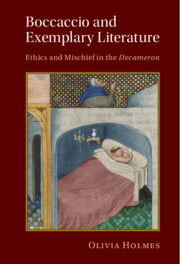Book contents
- Boccaccio and Exemplary Literature
- Cambridge Studies in Medieval Literature
- Boccaccio and Exemplary Literature
- Copyright page
- Epigraph
- Contents
- Acknowledgments
- Introduction
- Chapter 1 Ethical Fables and Antifeminist Exempla
- Chapter 2 From Sermon Story to Novella
- Chapter 3 Lives of Saints; Lives of Sinners
- Chapter 4 Classical and Vernacular Exempla
- Chapter 5 Magister Amoris
- Afterword in Time of Plague
- Notes
- Bibliography
- Index
- Cambridge Studies in Medieval Literature
Chapter 1 - Ethical Fables and Antifeminist Exempla
Published online by Cambridge University Press: 02 February 2023
- Boccaccio and Exemplary Literature
- Cambridge Studies in Medieval Literature
- Boccaccio and Exemplary Literature
- Copyright page
- Epigraph
- Contents
- Acknowledgments
- Introduction
- Chapter 1 Ethical Fables and Antifeminist Exempla
- Chapter 2 From Sermon Story to Novella
- Chapter 3 Lives of Saints; Lives of Sinners
- Chapter 4 Classical and Vernacular Exempla
- Chapter 5 Magister Amoris
- Afterword in Time of Plague
- Notes
- Bibliography
- Index
- Cambridge Studies in Medieval Literature
Summary
Chapter 1 begins by exploring Boccaccio’s debt to Aesopic fables, which were widely used in teaching Latin grammar. In the medieval educational system, ancient literature was frequently justified by the claim that the texts inculcated students with moral virtue, and the fables were presented as normative in both the linguistic and ethical spheres. Boccaccio recombines and reassembles their narrative details and plotlines, denaturalizing the apparent inevitability of the inherited outcomes and lessons. The Decameron also draws on the enormous patrimony of Middle-Eastern narrative materials that penetrated the West around the time of the Crusades. The chapter’s later sections investigate two didactic collections of Islamicate origin that circulated widely: the Book of the Seven Sages of Rome and the Disciplina Clericalis. Boccaccio borrows most extensively from the antifeminist tradition they embody in the novelle of Day 7, dedicated to the tricks that women play on their husbands. He rewrites a number of traditional anecdotes, undercutting their misogyny by allowing us to sympathize with the female protagonists and transforming the tales into celebrations of feminine ingenuity.
Keywords
- Type
- Chapter
- Information
- Boccaccio and Exemplary LiteratureEthics and Mischief in the <i>Decameron</i>, pp. 14 - 50Publisher: Cambridge University PressPrint publication year: 2023

